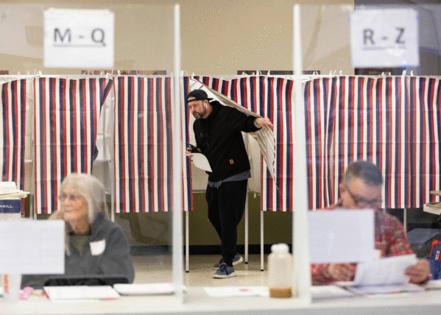Commentary: Open primaries topic creates a major tension for independents
Published in Op Eds
Open primaries create fine opportunities for citizens who are registered as independents or unaffiliated voters to vote for either Democrats or Republicans in primary elections, but they tacitly undermine the mission of those independents who are opposed to both major parties by luring them into establishment electoral politics.
Indeed, independents who are tempted to support independent candidates or an independent political movement can be converted to advocates of our duopoly if their states have one form or another of Open Primaries.
Twenty U.S. states currently have Open Primaries for at least one political party at the presidential, congressional, and state levels, including Georgia, Illinois, Minnesota, Ohio, South Carolina, Texas, and Wisconsin. At least 15 states conduct "semi-closed" primaries, a middle position in which unaffiliated voters still have an option to choose to vote in one of the major party primaries.
There are admittedly different kinds of independent or unaffiliated voters. Some individuals essentially support our political system but are not consistently aligned with either the Democratic or Republican camps. Sometimes they vote for Democrats, and at other times, they vote for Republicans.
Many are moderates, which explains why they might vote Democratic in one election or split their votes between Democratic and Republican candidates in a general election. In contrast, many independents are dissatisfied with both major parties and seek either a centrist political party or candidates who are more left-wing than most Democrats or more right-wing than most Republicans.
According to Thom Reilly, Jacqueline Salit, and Omar Ali in their book, The Independent Voter, most independents are anti-establishment and not ideologically aligned with either centrists, socialists, or libertarians. They are definitely not chiefly centrists or moderates, although many certainly are. Over 40% of all voters, according to Gallup surveys for over 10 years, do not identify with either major party.
It would be unfair to independents who are happy voting for Democrats and Republicans and not being committed to either party to discourage the passage of state laws that would create Open Primaries. At the same time, anti-establishment independents should not succumb to the temptation to vote for Democrats or Republicans if they are extremely dissatisfied and disillusioned with both parties, believing that establishment politics denies nearly half the public representation in Washington.
Reilly, Salit and Ali argue that most independents have a "mind-set" which sets them in opposition to our two party system, which is extremely polarized and fails to address many of the hard issues facing the country: climate change, the national debt, immigration, gun control, racial relations, child care and paid parental and medical leave, energy, and more.
There are other electoral reforms that are not biased in favor of our two-party system, notably ranked choice voting and impartial redistricting commissions. Each of these policies enables independent candidates for office to increase their chances of victory. With ranked choice voting (Maine uses this election mechanism, as do various counties and cities), independent centrists may ultimately surpass left-wing or right-wing candidates for office in a congressional primary.
An impartial redistricting commission can reduce the chances that extremist members of either party win their primaries because the individual districts will not be gerrymandered to make it nearly impossible for an independent, especially a centrist independent, to win a primary. Very red states and very blue states are well-known for having highly gerrymandered districts.
The Open Primary topic is much more complicated and provides a prism through which to conceptualize the tension within the entire group of independents in the United States.
There is no one block of independents. Over 60 million registered voters are classified as independents or unaffiliated voters, and they are divided between the pro-establishment and anti-establishment camps. Of the 80 million citizens who are eligible to vote but not registered to vote, approximately 30 million are also independents.
Is there a solution to this tension for independents in the United States? No, there is no solution. It is, however, important to recognize and understand the tension. Some observations may prove useful.
First, it is unlikely that either strategy can be dismantled.
Second, both paths will be pursued by independents, namely the path of fighting closed primaries and the path of supporting independent candidates for office, as well as an independent political movement.
Third, the first path may serve as a stepping stone to the second, but it is impossible to choreograph this process in advance. It definitely would not be a linear process.
_____
Dave Anderson edited "Leveraging: A Political, Economic and Societal Framework," has taught at five universities and ran for the Democratic nomination for a Maryland congressional seat in 2016.
_____
©2025 The Fulcrum. Visit at thefulcrum.us. Distributed by Tribune Content Agency, LLC.

























































Comments